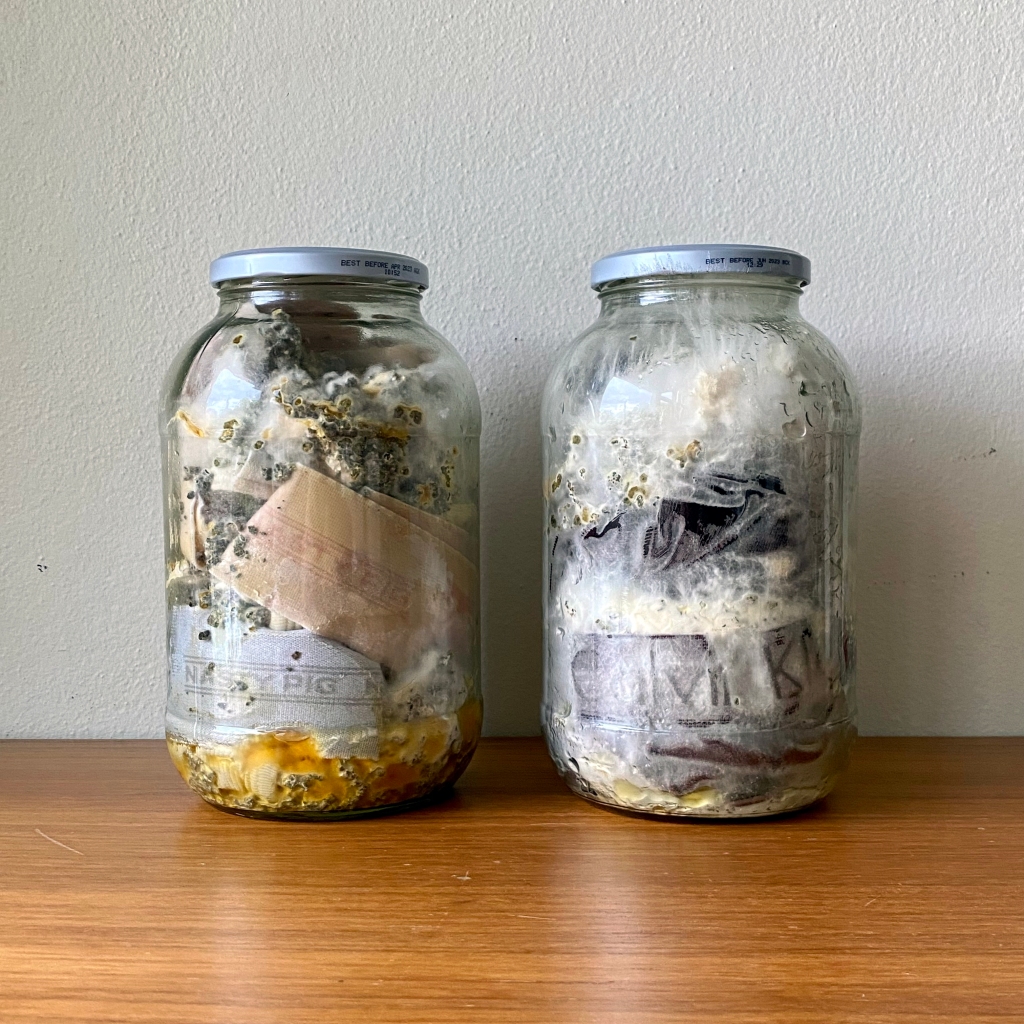
Queering Mycoremediation will be part of IM-PERMANENT, curated by Josh Riesel and team, hosted by RMIT Industrial Design and Ellis Jones Agency as part of Melbourne Design Week. The opening will be on Thursday May 18 at the Abbotsford Convent.

Circularity in fashion and textiles is often over-simplified. The widely shared butterfly diagram made up of separate technical and biological cycles masks the messy, complex, intermingled realities of how we live with clothing and textiles. The biosphere of earth is the biological cycle within which all other cycles exist, yet fashion and circularity discourse often ignores this. The Nature of Fashion by the Biomimicry Institute makes this point well. Circularity is important but it is not the key to an imaginary queendom of unlimited growth.
Queering Mycoremediation is an ongoing, open-ended experiment, inspired by Jack Halberstam’s The Queer Art of Failure. Two pickle jars contain an oyster mushroom growing in my old underwear: four pairs of black Calvin Klein briefs in one, four white Nasty Pig jockstraps in the other. The underwear is made from a mix of natural fibres (biological cycles) and synthetic fibres (technical cycles): cotton cloth, synthetic rubber waist elastic, synthetic sewing threads, and synthetic dyes. Oyster mushrooms may be able to digest the cellulose in the cotton, over time leaving behind the elastic waistbands and synthetic sewing threads. Six months in, the fungus appears content. (I smell it every morning to assess: a warm fungus smell tells me all is well.)
In 2019 I taught a class, Sustainable Systems, at Parsons School of Design where students were, as part of a science module, required to grow mycelium from a kit as a speculative new material during a three-week project. Growing mycelium into various shapes and then killing the fungus at the end of the three weeks left me with more questions than answers. In particular I was confronted with questions about the ethics of ‘collaborating’ with the more-than-human. This small experiment is a way to revisit some of those questions. My fundamental experience of fungi is from my childhood in Finland where we would spend the summers and autumns foraging for mushrooms. I understood them as vital in the ecosystem in breaking down the leaf litter: fungi transform death into life, and give us gifts of food in the process.
As well as Halberstam, I look to guidance in Alia Parker’s brilliant work. Merlin Sheldrake’s Entangled Life was a revelation. David Griffiths’ Queer Theory for Lichens is important, as is Against the Naming of Fungi by Nicholas P. Money. UPDATE 21.4.2023: Clare Press of Wardrobe Crisis has just released an episode with the amazing Sheldrake.
Given the vast quantities of clothing discarded each year the jars present a microcosm of the ongoing conflicts between biological and technical systems in landfills, soils and oceans across the world. Mycoremediation, working with fungi to restore health of ecological systems, will be critical for the fashion and textile industry, yet difficult ethical questions about our relationships with non-human relatives demand careful inquiry. The pickled underwear jars are a humorous conversation starter about a complex topic that, through our wearing of clothes, including underwear, pertains to every one of us.
Allways loving to learn from you. Thank you so much.